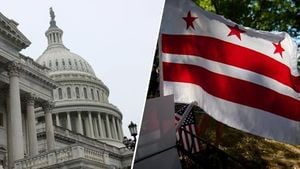Ben & Jerry's, the beloved ice cream brand known for its progressive stances, has found itself back in the headlines as it files another lawsuit against its parent company, Unilever. This time, the iconic Vermont-based brand accuses Unilever of curtailing its ability to express solidarity with Palestine amid the heightened conflict between Israel and Hamas. The case, lodged recently, suggests serious tensions brewing between the two entities, particularly concerning Ben & Jerry's longstanding commitment to social justice issues.
Detailed allegations within the lawsuit reveal claims of Unilever undermining Ben & Jerry’s attempts to engage publicly on several hot-button topics, primarily its support for pro-Palestinian activism. The lawsuit asserts Unilever has repeatedly violated agreements meant to protect the brand’s independence since it was acquired by the multinational conglomerate back in 2000. The core of the complaint hinges on the independent board created at the acquisition, intended to safeguard Ben & Jerry's mission of advocating for various social causes.
Ben & Jerry’s social mission has been clear for decades, guiding its actions far beyond just selling ice cream. The brand has historically taken bold positions on social issues like LGBTQ+ rights, racial justice, and climate change. "For over four decades, the company has pursued its unique Social Mission via its public, progressive stances on issues such as migrant justice, LGBTQ+ rights, Black Lives Matter, GMO labeling, and various other causes affecting historically marginalized communities," the lawsuit notes.
Illustrative examples cited by Ben & Jerry's describe instances where Unilever allegedly forced the brand to remain silent. The lawsuit recounts how, as the crisis escalated over the summer, Ben & Jerry's sought to release statements advocating for humanitarian actions, including calls for cease-fires and support for student protests over civilian casualties. These efforts were reportedly met with resistance from Unilever, which allegedly threatened significant repercussions including dismantling the independent board.
One particularly pointed example occurred when Ben & Jerry’s team attempted to post a supportive tweet about Palestinian safe passage. This effort was thwarted, with Unilever citing concerns over safety and geopolitical tensions surrounding the Iranian missile activities at the time. Such incidents highlight the increasing frustration within the ice cream company about their perceived loss of voice on issues they care deeply about.
The situation escalated to the point where Ben & Jerry's claims it was unable to support Vermont Independent Senator Bernie Sanders' legislative efforts aimed at blocking U.S. arms sales to Israel. Such actions, the brand argues, violate not just its social mission but also the core values held by its founders, Ben Cohen and Jerry Greenfield.
This legal battle is not the first confrontation concerning Ben & Jerry’s political activism. Back in 2021, the brand launched its legal efforts against Unilever concerning the sale of ice cream products in settlements deemed illegal under international law. The crux of these court actions rests on the fundamental question: to what extent can corporate identities maintain autonomy and authenticity, especially when entangled with large parent companies whose interests may diverge?
Adding to the complication, Unilever has openly stated its desire to remain neutral concerning the Israeli-Palestinian conflict, which has raised eyebrows among Ben & Jerry's loyal customer base. The company's stance has sparked debates about how brands should navigate political issues versus corporate neutrality. Given the global reach of Unilever, the stakes are high for both parties as they tread through this complex public relations maze.
Public reaction to the lawsuit is expected to vary, with many of Ben & Jerry's supporters expressing solidarity with their stand for Palestinian rights. Activism and social justice have become increasingly embedded within the brand’s narrative, and consumers expect them to stay true to their roots. For supporters, the idea of the ice cream company backing down from its advocacy feels like betrayal, and the brand risks alienation if it fails to push back against what it sees as corporate censorship.
On the flip side, Unilever has indicated they will defend their actions vigorously. The company’s legal team is set to argue against the allegations, asserting their decisions are rooted in the need for corporate stability and neutrality. These are not just legal terms; they translate to real impact on consumers and their relationship with the brand—something both Ben & Jerry's and Unilever need to navigate carefully.
This case highlights the delicate balance between activism and corporate obligation, posing the larger question of how socially-minded companies maintain their identities when faced with the pressures of corporate ownership. With social media's power amplifying every facet of public perception, losing sight of consumer expectations could lead to significant consequences for both Unilever and Ben & Jerry's.
Whether this lawsuit will change the course of their longstanding relationship remains uncertain. What’s clear, though, is the growing friction stemming from contextualized activism against corporate interests, and this dynamic might continue to shape Ben & Jerry's future endeavors. For now, supporters await to see whether Ben & Jerry's will hold onto its progressive edge or bow to the pressures of its corporate framework.



